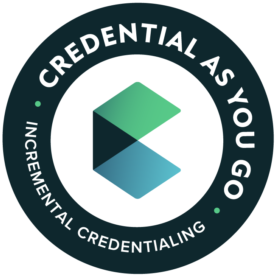
Early implementation stage
In 2020, implemented a credit for prior learning program which provides opportunities for experienced learners to meet with faculty to explore credit. As FGCU begins to offer more non-credit microcredentials, faculty proactively align student learning outcomes with academic coursework to allow for future opportunities to stack credentials. Work will focus on exploration to include the award of credentials when students have completed the general education program or a cadre of undergraduate courses. In some cases, this may be in the form of a general education microcredential or a certificate recognized at the state and federal levels and in others, the award of an associate degree.

Credential As You Go has acquired three phases of funding to date. Lumina Foundation funded Phase I, resulting in the Incremental Credential Framework for testing. The Institute of Education Sciences, U.S. Department of Education funds Phase II (Grant R305T210063), which focuses on rapid prototyping of and research on incremental credentials with a national campaign. An anonymous private donor fund at the Program on Skills, Credentials & Workforce Policy at George Washington University funds the development of the prototype Learn and Work Ecosystem Library. Walmart funds Phase III, which focuses on systems change for expansion and sustainability of incremental credentials. The opinions expressed are those of the authors and do not represent views of Lumina Foundation, Institute of Education Sciences, the U.S. Department of Education, Walmart, or George Washington University.